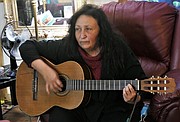Flathead Reservation-raised Salish and Blackfeet singer/songwriter and hip-hop artist Shadow Deveraux won the 2022 Native American Music Awards for Best Narrative Video. The national award was presented to him in November at an awards ceremony held in Niagra Falls, New York.
“It feels surreal,” he says. “Deep down in my heart, any award was my goal, but I get lost in my daily struggles and forget my goals and achievements. It reminds me that I am…”
Devereaux won top honors for the original song and video “Protect Your People” co-directed and filmed by Colton Olmstead. The video, which shows Deveraux rapping around the Flathead Reservation, is stitched together with scenes of his cousin Buck Morrigoe dancing in full dress, speaking Salish and playing an indigenous flute. It juxtaposes modern and traditional tribal life.
Salish elder Genn Hewitt was also nominated for Best Country Music Video for “Missing,” a song she co-wrote with Linda Mackenzie, which she performed in the video and submitted for the award.
Devereaux, also known as Foreshadow, created “Protect Your People” during the pandemic after Michelle Mitchell, head of the tribal education department, asked him to write a song to promote COVID awareness.
“I ran away from there with it,” he says. While the song addresses the virus, “From Evalo to Elmo, we know you can feel Flathead Nation, we can be his COVID killswitch” – Elder We also respect you.
“It has a lot of great cultural value if you listen to it,” says Devereaux. “I put into the lyrics what I learned as a kid as a Native American, and it was also related to his COVID because they go hand in hand.”
Devereaux grew up with Dixon, Charlo and Arlee and started making music in high school. “I could always write and I love poetry, so rap came a little more naturally.”
In 2010, he started getting serious about writing and recording his own music. In addition to UM-Western, he took his online course in recording at Berklee College of Music while studying business at the University of Montana.
Devereaux and Olmstead are now partners in Nu Wav, a multimedia studio in Missoula. Nu Wav offers videography, recording, mixing, mastering, engineering, photography, graphics and web design. Evan Ferris and Erik Langan also contribute their engineering and design skills.
He and his family moved from the reservation to Missoula during the waning days of the pandemic. With three young children, “I have a lot less time than I used to, but he’s also probably one of my biggest inspirations for writing,” he says.
Devereaux is working on his first solo album and already plans to submit music to the 2023 NAMAs. “If I am nominated next year, I will definitely go,” he says.
“It’s about all of us. We all won,” Huitt says of Devereaux’s song and his award. “They changed the wrap 360 degrees.”
Huit, who grew up in St. Ignatius, has had a long career in the music industry, opening for national stars such as John Lee Hooker, BB King and Leo Kotke in the 1970s. An active songwriter, performer, and storyteller for decades, she founded a non-profit in Minnesota in 1997 called the Native American Music Association, with the aim of promoting indigenous music. I started an organization.
Her song “Missing” was co-written in 2021 with Nashville singer-songwriter Linda McKenzie, who was living in Ronan at the time.
Huitt says Mckenzie approached her about writing a song together and “Missing” came to mind. The lyrics were fueled by the trauma of Billy’s recent murder of her 55-year-old St. Ignatius woman Darlene, whose body was found in rural North Dakota in 2018. Genevieve Margaret Huyt was found charred in her car more than 60 years ago.
“Grandmother walks, grandmother prays, grandmother weeps in the grave for the daughter of Salish, half Kootenay, in the land where the sun rises high,” the song continues. “And bitterroot flowers bloom in the cries of elders… Tears for children who must not die. She is a mother, a sister, someone’s wife…”
Mackenzie went on to record “Missing”, which included Huit chanting in the background. Steve Miller and Kenny Lee Lewis of his band provided guitars, percussion, bass and flute. She eventually submitted it and the accompanying video to her NAMA.
At a December gala honoring the two Salish musicians, Huit said Deveraux’s achievements acknowledged a greater truth.
“As I am about to complete the circle of life, I ask all young people to do the good work that our ancestors and my generation have been doing over the years to share our culture. I hope you continue.”
“Protect people, protect humans, protect children,” she urged.


